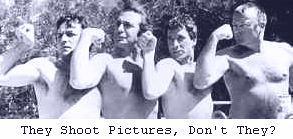The next movie, which clocks in at #818 on our list, is a 1925 silent film starring John Gilbert as a spoiled rich boy who fights in World War I. Being as familiar as I am with the Great War, I anticipate this being a barrel of laughs. Just kidding. It's probably going to be really depressing. Cheers!
Jim is a idle rich boy, perfectly content to rest on his laurels and enjoy the inheritance from his father's mill...that is until World War One starts (for America, anyway) and he reluctantly enlists, unwilling to disappoint his girlfriend and father. He joins the army and is quickly shipped off to a small town in the French countryside, where he falls in love with a pretty French girl. Putting aside how cute and romantic they are, the two lovebirds really can't understand a word the other is saying, and various hijinks ensue.
But then Jim and his comrades get the order that they're being sent to the front. Which is the very last possible place you want to be during World War I.
He and his fellow soldiers get sent into the fray - and when I say the fray, I mean walking through an open field getting picked off by German soldiers, hit by shrapnel, and gassed, with no concrete objective. Oh World War One, thy name is meaningless death. Jim, Bull, and Slim manage to hide in a trench created by a shell - until one of their superiors informs them that one of them has to go out into No Man's Land. Guys, it's called No Man's Land for a reason. It's really not a good idea to get caught out there. Anyway, Slim valiantly volunteers, and makes a pretty good go of it, until he's shot and killed by the Germans. Jim is tortured by Slim's dying call out to them for help, and he and Bull jump out of the trench to bring Slim back. Jim gets shot in the leg, and is luckily able to hide out in the midst of another Allied charge.
He wakes up in the hospital with a cast covering his entire leg. One of his fellow soldiers informs him that they're right by the town where Melisande lives - it has seen a whole lot of combat and has changed hands four or five times. Jim is concerned for Melisande, and decides that it's a really smart idea for him to attempt to crutch himself back to the town in the midst of a war. I disagree. But he does it anyway. Melisande isn't there, but guess what is? A whole bunch of explosions and fighting. Somehow, he is rescued and put into an ambulance.
The next time we see Jim, he's back in the States, being driven home by his proud father. His girlfriend has apparently been shacking up with his brother, and oh, by the way, did we not mention? Jim lost his leg. He is so not in the mood for the whole big family reunion, and when he and his mom get a second alone, he tells her about Melisande. She thinks that he needs to find her, if that will make him happy. Oh, the things you can do when you're rich. So Jim goes back to France, and despite not speaking the language at all, manages to track down Melisande. Happy endings all around! Well, except for Jim's left leg. And Slim. And the millions of other men who died in the war. And the horses who died in the war. OK, it's a happy ending, relatively speaking.
Random Musings:
- Jim's first words in the film are, "Me...work? I should say not!" Oh, I already can't wait for you to go to war and have heartbreaking experiences that make you into a better, wiser, less obnoxious human being.
- "For the love of Mike!" Who the hell is Mike? Since when is that an expression?
- As annoyingly foppish as his character happens to be, John Gilbert is kind of cute. I've heard that he had kind of a high-pitched, girly speaking voice, and that's why he couldn't make it in the talkies. I just wasted some time on youtube, and as far as I can tell his voice isn't unusually high, although it is a bit thin considering the type of dashing characters he played in the silent era. I think the biggest issue is simply that in the 30s, people wanted their matinee idols to be Clark Gable types, a man's man, rather than John Gilbert, who was always going to come off as an upper crust country club type. That's a shame, because I think he's actually pretty good here.
- Ugh, his stupid little girlfriend. "Aren't you glad we're going to war?"
- It never fails to amaze me when I watch a film like Broken Blossoms from 1919, and then a film like this from 1925, to see how far the medium had come in only six years. It's pretty impressive.
- Ummm...he kisses his mother pretty passionately. Should I be concerned about this? I don't know what kind of shenanigans rich folk got up to in 1925.
- How in the hell did Jim's girlfriend manage to send a cake through the post? Did she really expect that it would still be edible after travelling from New York to France by boat? Seriously?
- OK movie, I'm not sure if you're aware of this, but it's a lot more effective to have a musical number with all the soldiers doing their washing and singing In the Army Now in a movie that actually has sound. Some food for thought.
- "After an hour of his best sign language, convincing the wine-shop keeper that he wanted a barrel, and not a fat girl, Jim started on his way back." The fuck? Does this wine shop sell fat girls as well?
- Really, guy? Putting a barrel over your head is probably not the best way of transporting it back to base. But I do love him flirting with the French girl while he's got a barrel on his head. I like these two, they're cute. Especially since they clearly have no idea what the other is saying. And the dialogue cards just make them both look like complete idiots.
- Oh no Jim, you did not just catch a frog and tell the French girl that she's a frog too? Smooth.
- OK, I understand that Jim is a fairly typical monolingual American, but after all, he is a rich, presumably educated American, and I find it difficult to believe that he couldn't at least manage to pull "l'amour" or "j'adore" out of his ass.
- So...until Jim gets that letter from Justyn, I kind of forgot about her. This is going to be awkward. I mean, he should have at least had the decency to write her a reverse Dear John letter.
- I love John Gilbert's "Oh Shit" look when his company is being sent to where the action is. You can totally see how scared he is and how it all suddenly just became real for him.
- Aw, I'm so glad Jim and Melisande got their goodbyes in. It warms the cockles of my heart. But...why did he throw her one of his shoes? Isn't he going to need that?
- Wow...give credit where credit's due, these battle sequences are actually pretty intense. There's great music that builds up the tension, and it's horrifying how people are falling and dying all around them, and they just keep walking forward. It's a very realistic portrayal of the style of combat utilized in World War I - and it shows exactly why there were such heavy casualties. Jim's line, "They're not going to send us into that open field, are there?" is perfectly indicative of a soldier's experience in WWI.
- "But you're the champion spitter of the whole army!" Really? I'm pleased to know that our boys in uniform have been occupying their time usefully. That said, there is something touching in that earlier in the film, Bull and Slim tricked Jim into being the one to go fetch the barrel, and now they're literally fighting over who gets to run out into no man's land and be a target. The camaraderie is very sweet and underplayed.
- OMG...Slim's death actually made me tear up. And the look on Jim's face when he could hear him crying out, look, I'm not used to being effected emotionally by silent films, ok?
- I really like that in the battle scenes, they have music playing that wouldn't be out of place in a horror film, instead of the usual bombastic score with patriotic zeal. It's not glorifying the war at all - it's showing it in all its horrifying, grotesque realism. I can't remember seeing a film made before this that was anything other than positive towards the war experience. In fact...it's just really not that easy to think of many pre-1960s anti-war films. They exist, but they're pretty rare.
- I'm also impressed that they showed a soldier in the hospital suffering badly from post traumatic stress disorder. That's hardly a common feature of war films, is it?
- So I understand that Jim wasn't exactly faithful, but...she's got to feel like an asshole cheating on a man who just lost his leg in the war, amirite?
I really liked this film, you guys. It's unique in its treatment of the First World War. It's groundbreaking and heartbreaking and has some remarkably intense, realistic battle sequences, especially given the limitations of the medium at the time. John Gilbert puts in a really strong performance, and you can feel his helplessness as he is fighting in a war that doesn't seem to make sense. That he and his fellow soldiers are being thrown into dangerous situations for seemingly no reason at all.
A lot of times silent movies are treated as second class citizens of the film world, the general feeling being that sound films are simply superior to silent films. While sometimes that's true, and many silent films do have a certain handicap simply because they're being made at a time when people were just figuring out the whole "film-making" lark, it often does a discredit to truly great silent films. I think The Big Parade is not just a great silent film, but a great film, full stop, and one that really deserves to find a bigger audience. And, you know, be released on DVD.
That's it for me. Thanks for reading, and come back tomorrow for Sugar Cane Alley!
















0 comments:
Post a Comment